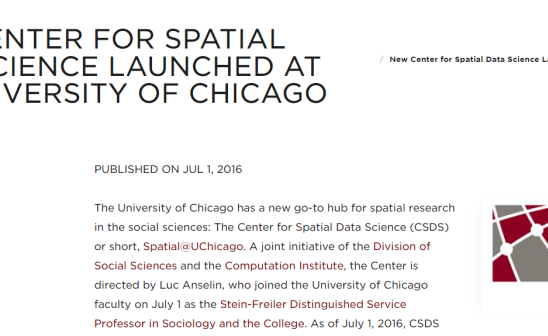New Center for Spatial Data Science Launched at the University of Chicago

The University of Chicago has a new go-to hub for spatial research in the social sciences: The Center for Spatial Data Science (CSDS) or short, Spatial@UChicago. A joint initiative of the Division of Social Sciences and the Computation Institute, the Center is directed by Luc Anselin, who joined the University of Chicago faculty on July 1 as the Stein-Freiler Distinguished Service Professor in Sociology and the College. As of July 1, 2016, CSDS succeeds the GeoDa Center for Geospatial Analysis and Computation at Arizona State University. Part of Luc Anselin’s GeoDa Center team also transitioned to the University of Chicago.

What differentiates the new Center for Spatial Data Science is a spatial perspective on data science and computational social science: The primary focus on location changes how research questions are framed and how they are answered, from databases, to analytics and visualization. The Center also brings together a focus on theoretically informed econometric modeling with a more data-driven tradition of computational analysis. Reflecting its ties to the social and computational sciences, CSDS has offices in both the Saieh Hall for Economics and the Computation Institute at UChicago’s Hyde Park campus.
The Center’s focus on spatial research, education and software development is reflected in its development of state-of-the-art methods for geospatial analysis, spatial econometrics, and geo-visualization that are applied to policy-relevant research in the social sciences. To enable researchers to use these methods, they are implemented through open source software tools such as GeoDa, GeoDa-Web and PySAL’s spreg API. Education about methods and tools is offered through classes and collaborations at UChicago and through online courses and support for a growing worldwide community of over 200,000 spatial analysts.
Current Center research includes federally funded work to advance spatial evaluation of health policy through spatial multilevel modeling and spatial econometric evaluation methods. Through ventures with local partners in Chicago, the Center is also currently developing open spatial technology platforms for enabling on-the-fly analysis of health data.
“Right now there is real excitement about advancing data science and the computational social sciences at the University of Chicago. We are looking forward to adding a spatial perspective to an already impressive array of existing and new research and initiatives,” said Luc Anselin.
To get in touch with Center for Spatial Data Science, contact spatial@uchicago.edu
(Originally Published on 07-01-2016)
 THE UNIVERSITY OF CHICAGO
THE UNIVERSITY OF CHICAGO

